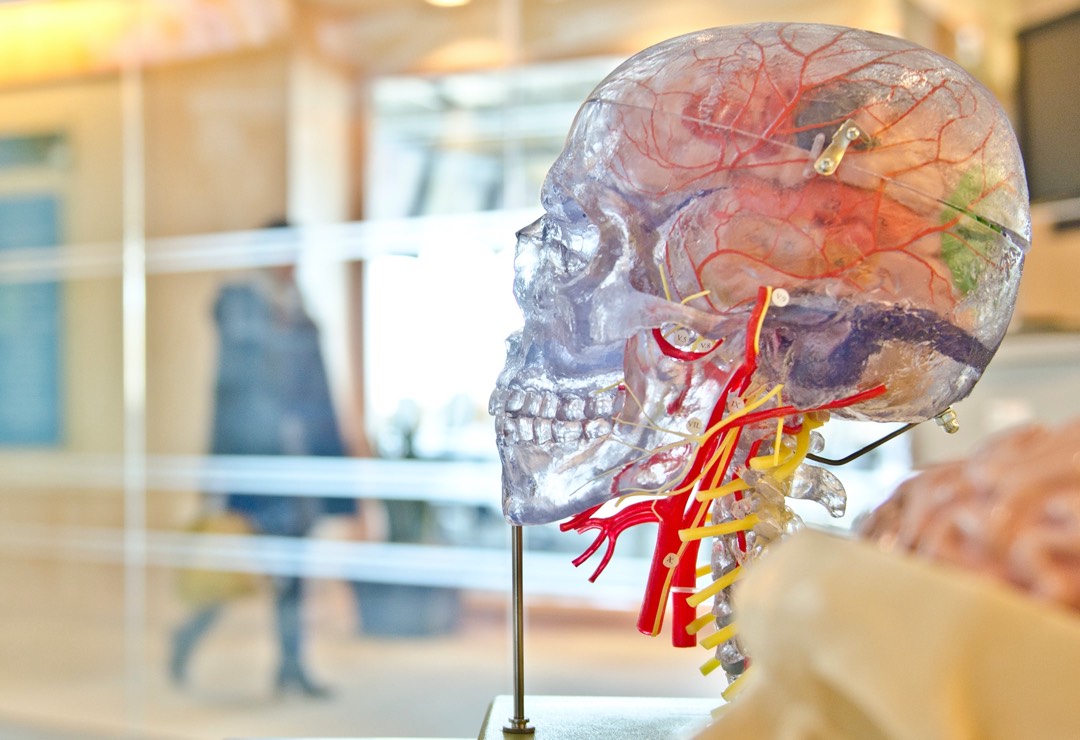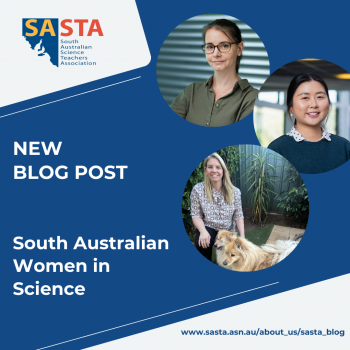
South Australian Science Teachers Association
South Australian Women in Science
Posted by SASTA
on 11/02/2024

This month we celebrate International Day of Women and Girls in Science on Sunday 11 February. We got in contact with some of the recent South Australian Tall Poppy winners to find out how they got started in science, what they're currently working on and their advice to future students.
 Dr Xanthe Strudwick
Dr Xanthe Strudwick
Dr Xanthe Strudwick, is a Research Fellow, Regenerative Medicine at the Uni SA, Future Industries Institute.
2023 South Australian Tall Poppy Winner
When did you realise your passion for science?
I have always been curious and wanting to understand the how and why of the way the world works. This meant that as a child I was always asking questions, basis of all scientific enquiry, and at school I loved Biology and looking deeper into how life works. Once I got to University, although I didn’t originally plan on being a scientist (I enrolled originally to do Forensic Psychology and decided to do a degree in Forensic Science as well so that I could get the full picture of how and why someone might commit a crime and then be caught), I soon found myself more interested in how living things worked and ended up changing my direction to complete a Bachelor of Applied Science (Biotechnology) along with a Bachelor of Humanities (majoring in Sociology and Applied Ethics). It was when I moved to Adelaide and completed a Bachelor of Health Science (Honours) and began researching proteins involved in wound healing and skin, that I knew I was made to be a Scientist.
What are you working on at present?
My research is still heavily focussed upon our skin and wound healing, particularly the role that one protein plays in those wounds which sadly don’t heal, such as what we see in diabetic patients who develop chronic wounds and may require amputation of the affected tissues or in burns patients, where we see really high inflammation and terrible scarring. This protein is called Flightless I because it was first discovered in flies, because when it doesn’t work properly, the flies can’t fly, and in people it is also super important, and I’m looking at how we can track it in patient’s blood, so we can know who is going to develop impaired healing like chronic wounds or bad scars, and stop this from happening.
How will your research impact society?
My research is super important for the thousands of people every day who are dealing with complications in wound healing. As you can imagine, caring for patients with these complicated wounds is really costly to our society, not only in the monetary sense, but really in the personal costs for the patients themselves who are unable to go our and enjoy life with those they love. A future where we can identify at risk patients, before the worst effects are felt, and target treatment to stimulate healing and reduce scar formation is one that I am striving towards.
Advice for future scientists
Maintain your curiosity and start working together with other curious people (scientists) to solve the big problems of the world. Never be afraid to ask questions of the world, yourself and others and always try to see the bigger picture.
 Dr Alexandra Whittaker
Dr Alexandra Whittaker
Dr Alexandra Whittaker has a unique background being trained as a veterinarian, animal welfare scientist, and lawyer.
2023 South Australian Tall Poppy Winner
When did you realise your passion for science?
I was interested in science from an early age- perhaps around 6 or 7. My Dad was a doctor who worked in a lab and I remember him taking me into work and showing me slides down the microscope, and running tests on blood samples. I was always interested in animals and biology. I used to spend hours in the garden watching worms and insects. I knew I wanted to be a veterinarian from quite a young age. I think having pets ignited this interest but my it was fuelled by my interest in science.
What are you working on at present?
I’m involved in a number of really interesting projects at present. A major one is a collaboration with engineers and computer scientists to see if we can develop a system of remote sensors, paired with Artificial Intelligence to automate recognition of behaviours in animals. We are currently trialling this at Adelaide zoo with the orangutans as a potential method of remotely monitoring animal wellbeing. In another project with a conservation focus we are trying to understand whether there is a difference in cognition between wild animals living in urban versus rural environments, and whether this is linked with a stress response. This may end up being a selection advantage for animals living in stressful urban environments.
How will your research impact society?
The general theme of my research is in finding new ways to assess animal welfare, that are both reliable and easy to use in practice. We currently rely heavily on behavioural observation of animals but this is time consuming and often subjective. I am hoping that by developing simpler, more automated assessment methods we can better assess animal welfare, and therefore intervene more quickly if there is a problem. Also, for many industries assuring the public of good animal welfare is needed to ensure continuing public support of the industry. So, finding objective and transparent ways to monitor welfare is a priority.
Advice for future scientists
I think the best advice I can give is to always stay curious and ask questions. No matter how much education or experience you have, you never know all the answers and there’s always more to learn. A good scientist is always asking the next question and recognising where there are opportunities to do things better. As with any pursuit I would also say stay true to whatever you are passionate about, there will undoubtedly be setbacks along the way but perseverance is worth so much. Also, recognise that you often learn more from the roadblocks than the successes, and there are usually many routes to take to get to the same endpoint- don’t give up!
 Dr Stephanie Wong
Dr Stephanie Wong
Dr Stephanie Wong is a NHMRC Research Fellow and Clinical Neuropsychologist with over 10 years' experience in clinical dementia research.
2023 South Australian Tall Poppy Winner
When did you realise your passion for science?
My favourite subject in high school was biology. I remember being enthralled by neuroscience and all the mysteries that we were yet to solve about the human brain. I truly discovered my passion for science when I studied Psychology at university, and learned about all the fascinating scientific methods that could be applied to discover the neurobiological basis of complex human behaviour.
What are you working on at present?
When most people hear about dementia, they picture older people with memory loss. But not all types of dementia start with memory loss. Other symptoms can include changes in personality and social behaviour, reduced motivation, getting lost in familiar surroundings and/or difficulties with financial management and decision-making. As these symptoms are poorly understood, it can be tricky to diagnose dementia and there are limited treatment options.
My research combines neuroscience and psychology to understand how changes in the brain lead to different symptoms of dementia. By understanding these links, I am currently working on improving the way we detect declines in people’s cognition and behaviour (e.g., for earlier diagnosis of dementia) and developing more effective interventions for these symptoms.
How will your research impact society?
In 2024, it is estimated there are more than 421,000 Australians living with dementia. While there is currently no cure for dementia, we know that it is not a life sentence. To help slow down disease progression, it is important to identify signs of dementia as early as possible and to introduce targeted interventions and support strategies. By improving the early diagnosis of dementia and developing more effective interventions, the ultimate goal of my research is to improve the quality of life of people living with dementia and their families.
Advice for future scientists
My advice for future scientists is to be creative! Find what interests you and see if you can answer the question or solve the problem in a novel way. The most interesting discoveries are often made through new perspectives.
Archive
- February 2026
- January 2026
- December 2025
- November 2025
- October 2025
- September 2025
- August 2025
- July 2025
- June 2025
- May 2025
- April 2025
- March 2025
- February 2025
- January 2025
- December 2024
- November 2024
- October 2024
- September 2024
- August 2024
- July 2024
- June 2024
- May 2024
- April 2024
- March 2024
- February 2024
- December 2023
- November 2023
- October 2023
- September 2023
- July 2023
- June 2023
- May 2023
- April 2023
- March 2023
- February 2023
- January 2023
- December 2022
- November 2022
- October 2022
- August 2022
- July 2022
- June 2022
- May 2022
- April 2022
- March 2022
- February 2022
- January 2022
- December 2021
- November 2021
- October 2021
- September 2021
- August 2021
- July 2021
- June 2021
- May 2021
- April 2021
- March 2021
- February 2021
- January 2021
- December 2020
- November 2020
- October 2020
- September 2020
- August 2020
- July 2020
- June 2020
- May 2020
- April 2020
- October 2018
- September 2018
- August 2018
- July 2018
